Isotretinoin and Acne treatment
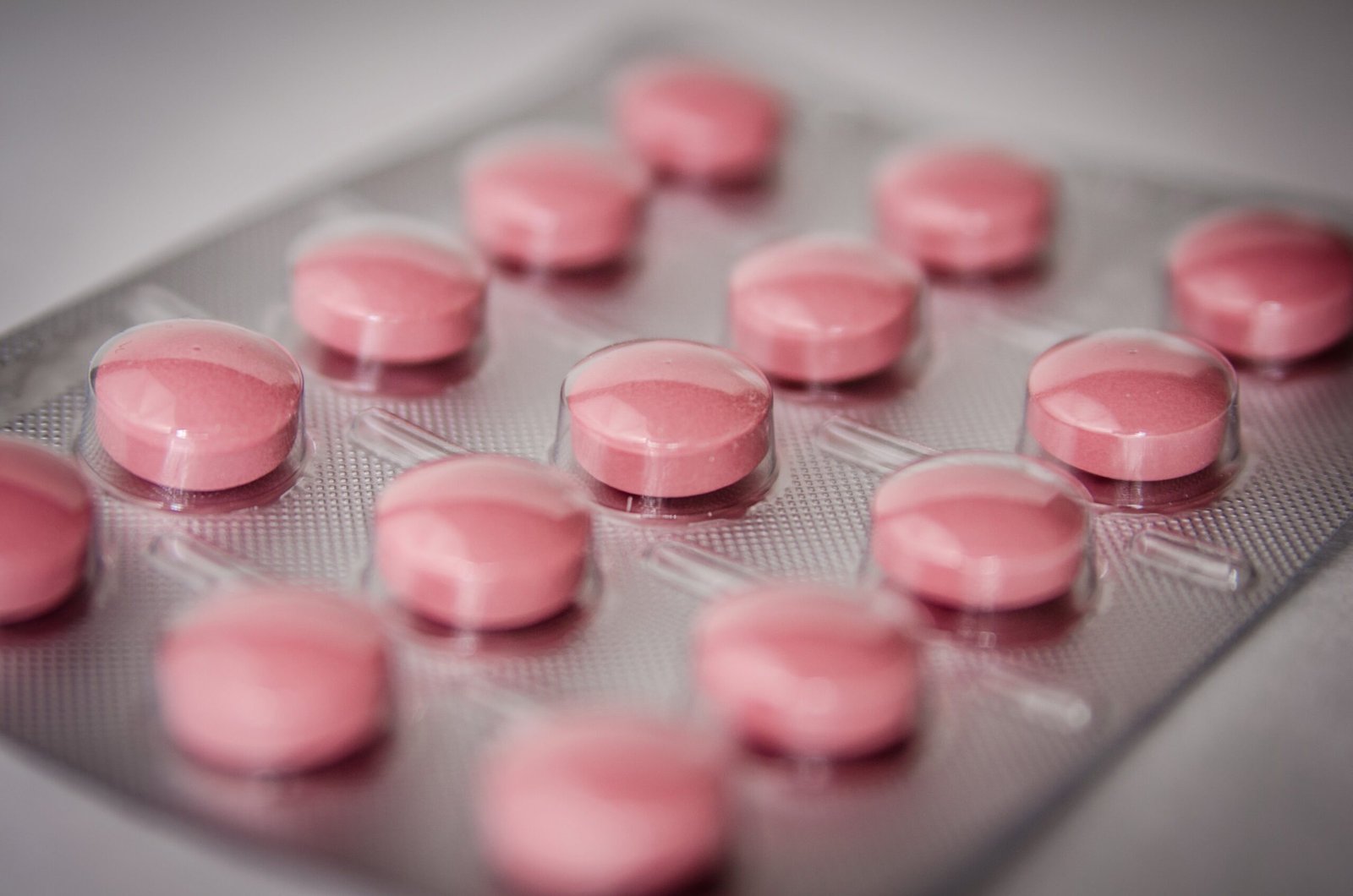
What is Isotretinoin?
Isotretinoin is a medicine that can be effective in treating severe cases of acne and is commonly used when there is a risk of scarring.
If other treatments (for example antibiotics) are not working or proving to be effective in clearing severe acne, isotretinoin may be considered as an alternative.
A Consultant Dermatologist would normally prescribe the medicine, recent guidance from the MHRA suggest that in patients under the age of 18 two doctors are required to agree to start this medication.
Isotretinoin belongs to a group of medicines known as retinoids.
Retinoids are compounds that derive from vitamin A.
Isotretinoin can also in some cases, be prescribed for severe cases of rosacea, seborrhoea, hidradenitis suppurativa and scalp folliculitis.
Roaccutane is the brand name for the drug (in tablet form) in the UK and isotretinoin may have other brand names in other countries. Isotretinoin can also come in the form of a cream or gel.
It is used for severe acne or when acne starts to scar, is not responsive to other medication or has been particularly persistent.
Additionally, isotretinoin is employed when acne spreads extensively, particularly affecting the trunk, which is sometimes less responsive to oral antibiotics.
The medication is sometimes recommended when acne leads to scarring or post-inflammatory hyperpigmentation. The isotretinoin does not remove scarring, but the aim of treatment is to stop the acne producing more scars.
Isotretinoin is utilised for treating acne which proves challenging to manage with other methods such as oral antibiotics and spironolactone.
How does Isotretinoin work with Acne?
One of the primary causes of acne is the overproduction of sebum, an oily substance produced by the sebaceous glands. Isotretinoin works by reducing the amount of sebum produced in the skin by the sebaceous glands.
Although it is not a cure, Isotretinoin will significantly reduce the sebaceous gland activity which can result in the patient having a prolonged period of remission of the acne, with clear skin remaining sometimes for many years.
Isotretinoin and Pregnancy
Isotretinoin must not be used whilst pregnant as it can cause birth defects. All prescribed oral retinoids including isotretinoin have an associated Pregnancy Prevention Programme (PPP), in which the patient will participate, if female and of childbearing potential.
Contraception for females whilst taking isotretinoin
All females of reproductive age who are sexually active should adhere to one of the following precautions throughout their course of isotretinoin treatment and for a period of four weeks before starting treatment and four weeks after stopping the medication:
- Use two reliable varying methods of contraception. For example the contraceptive pill and a barrier method such as condoms.
- Use one form of very reliable contraception, such as an intrauterine device, contraceptive implant, or injection.
It is not advisable to use barrier methods of contraception on their own. The Dermatologist who is prescribing you isotretinoin will discuss contraception prior to commencing the course of treatment.
Females of reproductive age will need to take a pregnancy test before starting treatment, and once a month, whilst they are having the treatment and one month after they have finished the treatment.
If you think that you may have become pregnant you must stop taking Isotretinoin immediately and speak to the Dermatologist who has prescribed you the medication as soon as possible. A termination of pregnancy may be advised.
For men, there is no need to use contraceptive precautions whilst taking isotretinoin as there is no impact on male sperm count or male fertility.
There is also no evidence to suggest that children conceived by men taking the medication will develop birth defects.
Here is a link to UK government guidance on preventing pregnancy during isotretinoin treatment.
Common Side Effects
There are several potential side effects when using isotretinoin.
The dose you take will influence the severity of the side effects you experience, together with your medical history. For example dryness, which is a common side effect is more severe on higher doses and maybe more problematic if you have a history of eczema. Dryness can generally be managed by your Dermatologist and a lower dose taken for a longer period of time may be advised.
It is very important to be aware of the side effects and tell your Dermatologist if you are experiencing anything whilst taking isotretinoin.
Some of the more common side effects include:
- Dryness of the skin, lips, and eyes. A non-comedogenic moisturiser and lip balm can be used to alleviate symptoms. Avoid using any harsh chemicals on your skin such as soaps and gels. In some more severe cases, dry skin can progress to eczema.
- Dryness of the nose and nose bleeds caused by dryness in the nasal cavity. Vaseline can be applied to alleviate symptoms.
- Discomfort when using contact lenses. Over-the-counter artificial tear eye drops can be used to rehydrate the eyes. If possible do not wear any contact lenses.
- Increased risk of skin infection and delay in wound healing. The skin may feel fragile and peel with friction. It is recommended to avoid waxing, epilation, dermabrasion, or laser treatment. Avoid tattoos and piercings. Shaving is generally tolerated, using a moisturiser afterwards will help. Your skin may be more sensitive for up to six months after taking isotretinoin medication.
- An increased sensitivity to sunlight, Avoid direct sun exposure and use sunscreen with SPF 50. The use of sunbeds should be avoided whether you are taking isotretinoin or not.
- Muscles and joints may ache, especially after exercise. Paracetamol can be used to manage symptoms. If your aches and pains become severe you must inform the Dermatologist who prescribed you the medication. Strenuous activity such as workouts and sports should be avoided where possible as this can cause muscle breakdown.
- Temporary hair thinning can occur.
Rarer Side Effects
There are a number of more concerning side effects that can occur when taking isotretinoin, however, these are rare and most people do not experience them.
- Isotretinoin can affect your vision. In particular, the ability to see at night may be impacted. Patients taking isotretinoin whose jobs may involve the operation of heavy machinery, driving, piloting aircraft or military roles should discuss with their employer before starting treatment with isotretinoin. Pilots will need to check with the most up-to-date Civil aviation guidelines.
- Patients may experience increased levels of fats in the blood or inflammation of the pancreas and liver. Isotretinoin can raise the level triglyceride levels (one of the types of fat in the blood). Your Dermatologist may conduct blood tests to monitor potential side effects during treatment.
- Changes in mood and behaviour can occur (between 1 in 1,000 and 1 in 10,000 chance). In some very rare cases, patients experience thoughts of self-harm and suicide. Before starting treatment your doctor or Dermatologist will discuss whether you have had any problems with mental health, low mood or suicidal thoughts. Your Dermatologist may also ask you to complete psychological questionnaires before and during the course of treatment.
- One of the rarer side effects is raised pressure in the brain with a less than 1 in 10,000 chance. This can cause severe headaches, nausea, vomiting and blurred vision.
- Some reported sexual side effects including erectile dysfunction, vaginal dryness, and decreased libido. Whilst rare, these symptoms can occur after coming off the medication.
- There have been a few rare cases of patients who are taking isotretinoin developing inflammatory bowel diseases such as Crohn’s disease and ulcerative colitis. Although the link with isotretinoin has not been confirmed to cause this if you develop bloody diarrhoea, notify your doctor or Dermatologist immediately or visit Accident and Emergency if you are experiencing severe symptoms.
Because of the wide variety of side effects that may be associated with taking isotretinoin, it is vitally important to report anything unusual that you may be experiencing to the Dermatologist who is handling your isotretinoin treatment.
Things to avoid whilst taking isotretinoin
There are a number of precautions that a patient must take when using isotretinoin. Your Dermatologist will run through all of these prior to starting the treatment.
Giving blood
You are not allowed to give blood whilst taking isotretinoin and for 1 month after taking the medication in case the blood is given to a pregnant female.
Taking other medications with isotretinoin
Whilst it is safe to take most medications with isotretinoin, some medications may interact.
Your Dermatologist will discuss whether any medication that you are taking will interfere with isotretinoin, and advise accordingly.
Some medications to avoid include Tetracycline (including doxycycline, minocycline) antibiotics, Methotrexate, Warfarin and Vitamin A (retinoic acid) supplements.
Drinking alcohol whilst taking isotretinoin?
Whilst you can drink alcohol whilst taking isotretinoin, it is strongly advised to keep the amount to a minimum. Drinking excessive amounts of alcohol whilst taking isotretinoin carries a risk of damaging your liver.
How long is a course of isotretinoin and what is the dosage?
Your Dermatologist will determine the correct dosage based on a multitude of factors. The patient’s weight, their responsiveness to treatment and the presence and impact of side effects will all be taken into account. The range of dosage for acne is less than 0.1-1 mg per kg of body weight.
A typical treatment of isotretinoin may be between 6 and 12 months, but on lower doses may continue for many months..
Isotretinoin should be taken at the same time every day. It is best taken with a meal, preferably containing fatty foods such as milk, avocado, and nuts - as this helps with absorption into the bloodstream.
Can isotretinoin be used more than once if a patient experiences an acne relapse?
Most patients’ acne clears during a course of isotretinoin, many patients will need no more treatment for the acne. However, it is important to understand isotretinoin is not a cure and the acne can recur. If the acne reoccurs then patients may take another course of isotretinoin. Data shows that recurrence is more common in females than males who are 25 years and less.
Frequently Asked Questions
Response times are variable, some patients notice an improvement in the first month. It is not uncommon to experience a flare of acne when the isotretinoin is commenced and when the dose is increased. This will to some extent depend on the type of acne you have. Flares are less of an issue if a low dose is started initially. Acne flares tend to settle quickly and most people have very few new lesions arising after 4 or 5 months of treatment regardless of the dose taken.
In most cases, isotretinoin is very effective in clearing even severe acne.
Yes, isotretinoin will increase the skin's sensitivity to UV light that comes from the sun.
Where possible avoid direct exposure to sunlight, seek shade when outdoors.
Wear a SPF 50 with good UVB and UVA protection on areas of the skin that are exposed.
Wear long-sleeved shirts to cover your arms. Wear a rash guard with SPF protection when swimming outdoors.
No, the medication can be transmitted into the breast milk and could harm the baby.
It can take a matter of months to see improvements. The acne may worsen and flare in the first few weeks of treatment.
What our patients say…
Dr Glass put me on a course of medication which was successful in treating this condition. I have now been happily discharged 🙂
Throughout my treatment, I found Dr Glass to be extremely conscientious, caring and thorough. He fully explained all the available treatment options to me and possible side effects. I felt I was properly informed.
He also explained to me that skin is very unpredictable and if I have a predisposition to skin allergies, then flare-ups could recur in the future. If this happens, I would have no hesitation in consulting with Dr Glass again, if need be. I would also have no hesitation in recommending him to others.
His knowledge, expertise and attention to detail, is not only reassuring but enables you to build trust and confidence going forward in whatever treatment path is required.
I have recommend him to family
and friends for diagnosis and treatment, as I believe Daniel is the leading consultant in his field for Northwest London.
When I saw Dr Glass in 2017, he diagnosed and treated my skin issue very swiftly. Within weeks I was looking well but mentally that boosted my confidence too.
I needed to see him again and I was not going anywhere else, as he was the right person to treat my skin condition again. Dr Glass once again diagnosed and treated my skin condition on a different issue very quickly and within 6-7 weeks, my skin feels new.
Thank you once again Dr Glass; I will not hesitate to recommend you to anyone seeking your services as I know they will be in the best care.
Learn more about skin conditions

The Importance of Checking Your Moles
Protect yourself from melanoma with regular self-assessment. Learn the signs to look out for and when to see a dermatologist. Read more for essential insights.
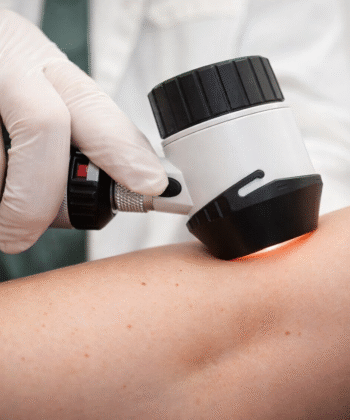
BCC vs SCC
A skin cancer diagnosis raises immediate questions. If you've been diagnosed with basal cell carcinoma (BCC) or squamous cell carcinoma (SCC), you need clear information about your condition and treatment options.

Melanoma and Ultraviolet Light: What’s the Link?
According to Cancer Research UK, around 85% of melanomas in the UK are caused by too much ultraviolet radiation. The number of people being diagnosed with this type of cancer has increased and is now the 5th most common cancer in the UK.
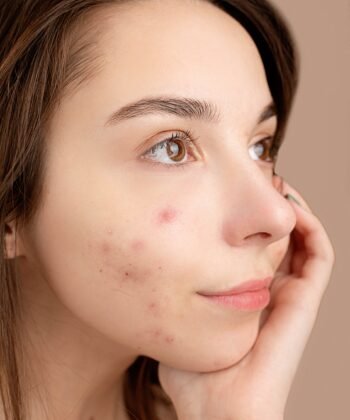
The Truth About Acne
Acne is a debilitating disease that affects over 18 million people in the UK. A lot of people say it’s a teenage issue that you can grow out of, but it affects many people right through to their adult life and can completely take over people’s lives.
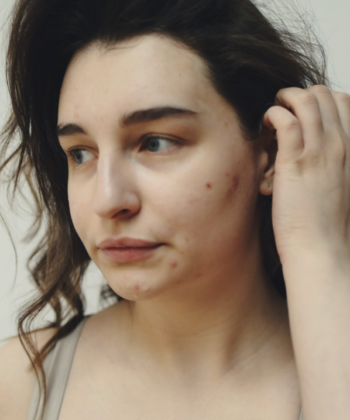
Pregnancy Acne: What Are the Causes?
Pregnancy acne, stemming from hormonal shifts, affects up to 43% of expectant mothers, often causing breakouts and discomfort. Learn about the causes, prevention tips, and expert solutions at The Dermatology Clinic London.

Acne in Teens and Young Adolescents
One of the reasons teenage acne flares is as a result of hormonal changes in the body that cause the glands under the skin to produce excess sebum. It is these hormones that play a major role in influencing how the sebaceous glands function.

Skin Allergies – Why they Happen and How to Take Care of Them
Allergies are the most common chronic disorder in the United Kingdom; it is estimated that around a quarter of brits will be affected by some kind of allergy during their lives, a number that is expected to increase exponentially going forward.
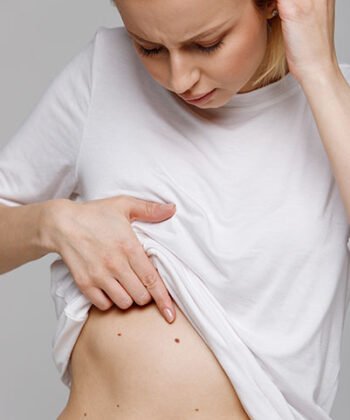
Why Does My Mole Itch?
Itching or pruritus is often a sign of dryness or irritation of the skin’s surface. As a result, our skin’s nerve endings, also known as pruriceptors, are stimulated.

The Impact of Diet on Acne: What You Eat Matters
Diet plays a critical factor in a person’s overall health and well-being. People with a healthy balanced diet tend to live longer and have a lower risk of developing serious health problems such as cardiovascular disease and type 2 diabetes.





